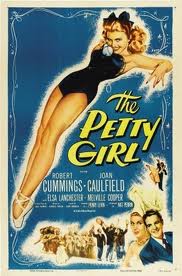
THE PETTY GIRL
US, 1950, 88 minutes, Colour.
Robert Cummings, Joan Caulfield, Elsa Lanchester, Mary Wickes, Melville Cooper.
Directed by Henry Levin.
A very lightweight frothy comedy of the late forties. It is of some interest as a piece of Americana because it portrays, lightly, one of the artistic creators of cheesecake and the use of the glamorous girl for advertising. Petty belongs in a parallel kind of way to the popular art of Norman Rockwell.
The songs are by Harold Arlen and Johnny Mercer and are not particularly memorable. However, the original story was written by Mary Mc Carthy ('The Group', 'Memories of a Catholic Girlhood). Robert Cummings is easy in this kind of light comedy lead and Joan Caulfield, generally more demure, is a pleasant heroine.
1. An entertaining comedy? American froth? Its entertainment value and impact in the fifties? Now?
2. The film as a piece of Americana? A picture of America's past, attitude towards advertising, glamour, cheesecake? Comparisons with attitudes now?
3. The conventions of the musical comedy - songs, choreography, fantasy? The world of the prim school, the contrast with New York, night clubs etc.? farcical situations, mistaken identities? How well and entertainingly used were these? How attractive and sympathetic a couple were George and Victoria? and having the audience on side for the themes of glamour, cheesecake, the American way?
4. How enjoyable the gallery of supporting characters? Expected types, the way they were portrayed? Enjoyable?
5. The theme of sex and sexuality with the light touch? American reserve, prudery? Sensuality smouldering under the surface? Sexual fears, letting go? though lightly done, did this ring true?
6. The film's attitude towards cheesecake? The title, the credits and the various pictures of Petty's work? Seeing him at work sketching the glamour girls, the contrast with the attitudes of his patron and the various commissions? Victoria's pleasant reaction to the art? Her poses? Placing his work in the art gallery? The Petty Girl? Petty Girl and burlesque and bringing it into New York high society? Advertising with glamour girls? Audience response to this?
7. How light, how serious this treatment? The impact now? The change in attitudes from the forties and fifties with Women's Lib and the condemnation of exploitive advertising?
8. Robert Cummings' style as George Petty? As a character, advertising man, his work with his patroness, painting the commissions, hopes for art? The encounter with Victoria? The importance of his narrative giving a tone to the whole film? The encounter in the museum and Victoria spurning him, the outing and arranging it, the night club and the clash with Victoria and his leaving, Uncle Ben, The Professor? The shift to the more wild night club and Victoria's drinking, the mix-ups and the arrest? The compounding of this with the visit to the forbidden night spot and their arrest? The picnic and Victoria hiding in the tree? His painting her and her being caught? His confronting the two women and his decisions? His visit to the burlesque, the burlesque coming to high society and his making his choice? Comic routines, songs? The typical presentation of the light American hero?
9. The character of Victoria - as teacher, singing, fancy free with singing, dancing and glamour? Being transformed into the schoolmistress? In class, going to the convention in New York? Her relationship with the Professor? With the teacher who wanted to be chaperone? Her warding off Petty's attentions, changing after the drinking, the fantasy of dancing in the night club? The arrest and the repercussions, her reactions to George's following her to the school, going out with him, being arrested again, the enjoyment of the boat ride and its aftermath? Her smouldering sensuality and its breaking out? Her confrontation of the Board and the decision to marry George? The burlesque, the Professor, the happy ending?
10. Uncle Ben and the comedy of the British butler, the night out posing as Uncle Ben, good hearted, coming to the rescue? The Professor and her letting down her hair?
11. The portrait of the staff ? expected stiffness, making of prim and censorious remarks, attitudes being satirized? The pleasant change at the end?
12. Pictures of New York high society, the contrast with the burlesque world?
13. Contribution of songs, dances, fantasy, comedy routines?